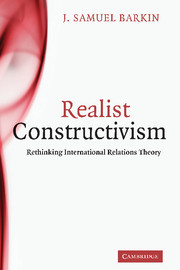6 - The constraints of the social
Published online by Cambridge University Press: 05 June 2012
Summary
A basis in the logic of the social, beyond its association with the concept of the public interest, has a number of other ramifications for approaches to the study of international relations. This basis, combined with an acceptance of historical contingency, allows one to use an approach as a lens through which to look at the social bases of international politics, and the processes of social construction and change of those politics, in a way that is impossible otherwise. Both constructivism and classical realism meet these conditions, and as a result display this potential to help us understand international politics. But the combination of the logic of the social and of historical contingency also places constraints on what can be done with these approaches, by forcing scholars who use them to accept that social constructions matter, that they differ across identity groups and other social entities (in turn complicated by the fact that identity groups overlap), and that they change over time.
Among these constraints are the need to contextualize power, the need for reflexivity, and the need for research methods that are both social and contextual. These three constraints can all be deduced through similar reasoning, which involves the application of the logics of the social and of historical contingency to specific questions of ontology, epistemology, and methodology. The reasoning in all three cases focuses on a combination of intersubjectivity and historicity.
Information
- Type
- Chapter
- Information
- Realist ConstructivismRethinking International Relations Theory, pp. 83 - 99Publisher: Cambridge University PressPrint publication year: 2010
